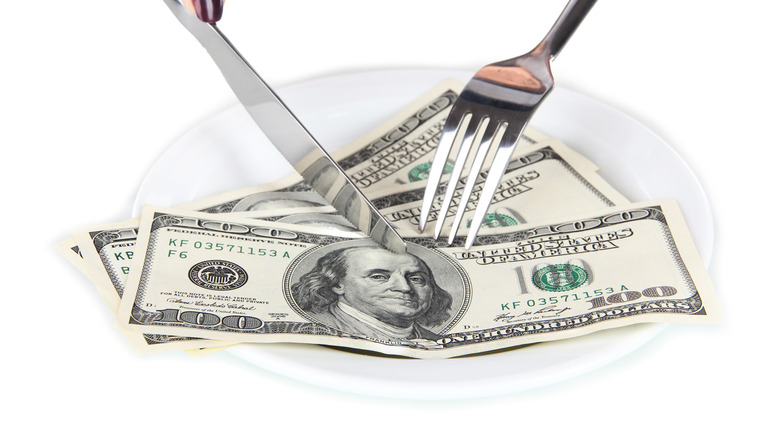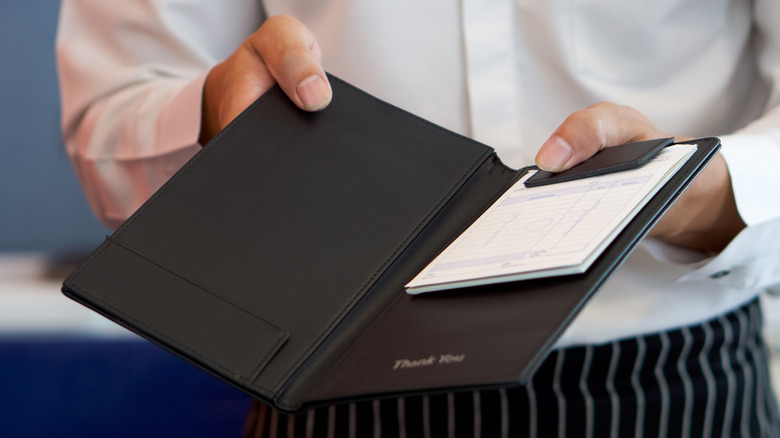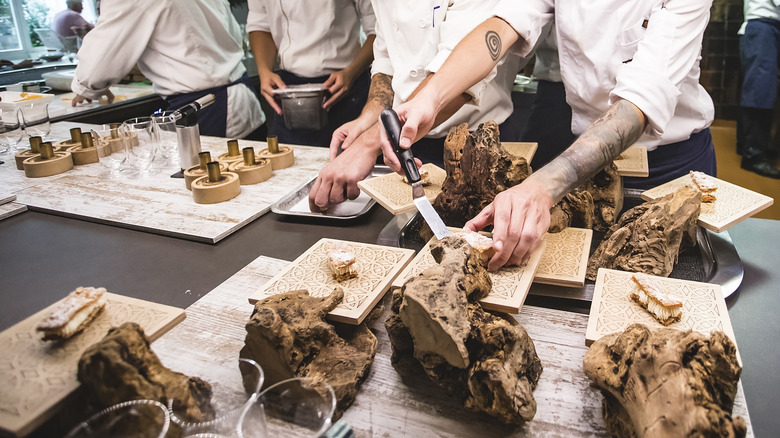Not Everyone Wants A Holiday Prix Fixe. Here's Exactly Why
It's the week before one of those holidays like Valentine's Day or New Year's Eve. The previous month exists only in your memory now, having faded into the black abyss of time faster than TikTok's latest viral pasta recipe. The upcoming holiday has caught you by surprise, but that's okay — a week should be more than enough time to secure a dinner reservation for you and your partner, your loved ones, or yourself, right? Maybe — but if you live in a big city, or one that classifies itself as a "foodie destination," there's a pretty significant chance you're going to have limited options.
Even if you do manage to score a table at a nice restaurant between the hours of 5 p.m. and midnight on whatever special holiday-centric occasion is fast approaching, the fare probably won't be what you're used to. Instead, you'll likely be faced with a prix fixe menu, sometimes referred to in reservation apps as an "experience." (For the uninitiated, this dining concept — borrowed from the French term for "fixed price" — comes with a pre-determined cost and pre-set courses.)
Don't get us wrong — there is a time and a place for a prix fixe program, and we'll get into its benefits, including the recent role it's played in buoying struggling restaurants. But first, we need to talk about its downfalls: Namely that the prix fixe has become a tad too widespread (and a tad too commonplace) when it comes to special occasions.
Prix fixe menus everywhere, and not a bite to eat
Let's start with the most obvious gripe over holiday prix fixe menus: the price. Of course, every restaurant is different, but in a city with a bustling dining culture like New York City or San Francisco, it's not uncommon for a holiday meal to set a diner back upwards of $100.
On Valentine's Day 2023, for example, the NYC seafood restaurant Vestry slung a romantic prix fixe for $175 per person. The four-course meal featured delicacies like cured Hamachi, celeriac soup, risotto, Maine lobster with foie gras, and strawberry trifle with Tahitian vanilla. Uptown at Hav & Mar, celebrity chef Marcus Samuelsson offered up a slightly more frugal option, with a three-course meal for $95 per person complete with a "Lover's Bread Basket" and an optional $45 wine pairing. Over in Queens, the oceanside Bar Marseille served escargot, steak frites, and creme brûlée for $65 a pop.
The problem isn't technically with these offerings themselves, whose price tags are presumably worth every penny. The actual issue is fomented by droves of restaurants running prix fixe programs on the same day. Whether intended or not, this practice subsequently excludes diners who would otherwise be content to pick and choose the less pricey items from the menu of a nice restaurant, assumingly on a special occasion, without breaking the bank. To put it one way: If all the restaurants on your list are pushing fixed-price menus on the same holiday, you're going to have very limited options as a price-conscious diner.
Are there benefits to prix fixe menus?
For the sake of clarification, prix fixe menus aren't on their own a bad thing — especially when they're not taking over three-quarters of a major city's restaurants on a given holiday. In the days leading up to holidays in which these types of menus are particularly common, people should have the option to cash in for a chef's choice dinner. (Or, at the very least, have the choice to opt out of the prix fixe trap entirely and decide upon a less-expensive culinary adventure at an equally nice restaurant.) But on an average weekend or a holiday that plays host to fewer prix fixe experiences? In that case, prix fixe menus all the way.
In 2022, Eater's Erika Adams explored how prix fixe menus, or tasting menus, are an essential tool for struggling restaurants still clawing their way out of pandemic-bred financial strain. A set menu means more consistent business, says Adams, who adds that prix fixe menus allow kitchens to bypass "unpredictable demands" from diners, reduce food waste, and work more efficiently — all with fewer time constraints.
If a small restaurant makes a habit of running a prix fixe, frugally minded diners would come to expect it on holidays, potentially saving them from toiling dejectedly in the "experience"-heavy waters of Resy. As for eateries with enough clout to serve whatever they want and still bring in business? Save the prix fixe for another night.


